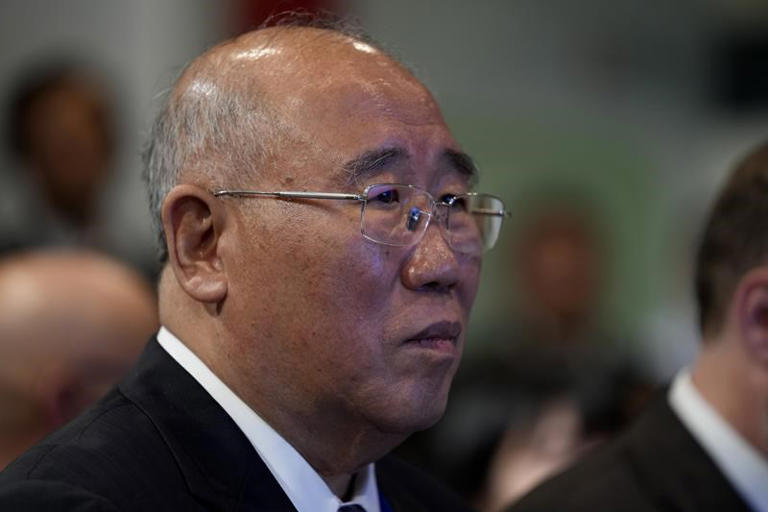
DUBAI, United Arab Emirates (AP) — Veteran negotiators at the United Nations climate talks Saturday said that the push to wean the world from dirty fossil fuels had gained so much momentum that they had poked a powerful enemy: the oil industry.
Late Friday, multiple news sources reported that the leader of OPEC, the powerful oil cartel, wrote to member countries earlier this week urging them to block any language that would phase out or phase down fossil fuels. The news had the effect of a thunderclap, shining a light on host and petrostate United Arab Emirates, which clearly has oil interests but also wants to show the world that it can lead the conference toward a substantive result.
Environmental activists, still smarting after decades of soft power from oil interests keeping such discussions from seeing the light of day, smirked at signs that the mighty cartel was circling the wagons.
“I think they’re panicking,” said Alden Meyer, an analyst with climate think tank E3G “Maybe the Saudis can’t do on their own what they’ve been doing for 30 years and block the process.”
Former Ireland President Mary Robinson said, “They’re scared. I think they’re worried.”
Robinson, co-chair of the retired leaders group The Elders, is now a prominent climate campaigner. She said that OPEC is concerned “gives me hope.” Last month she clashed publicly with the president of the COP28 negotiations, Sultan al-Jaber, who is also CEO of the Emirates’ national oil company.
China's climate envoy Xie Zhenhua called this year's climate conference the “most difficult” of his long career. He said the contentious phase-out issue could be solved in one or two days.
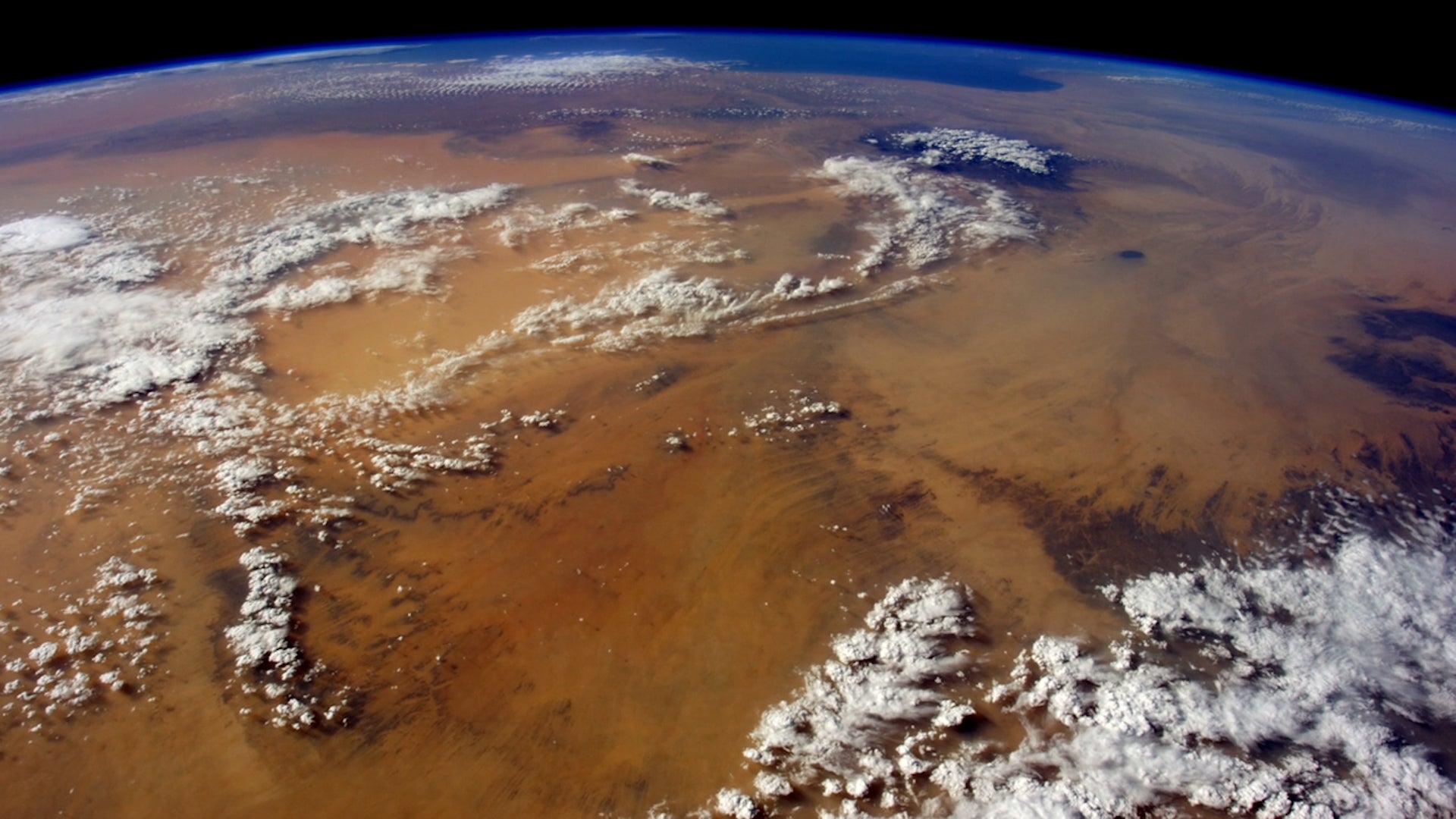
The Weather Channel Earth Nearing Key Tipping Points On Climate Change, Report Says
1:12
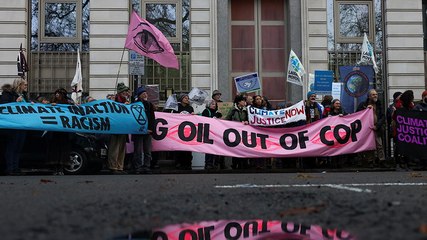
Dailymotion London protesters urge leaders to do more to tackle climate crisis on global day of action
1:40
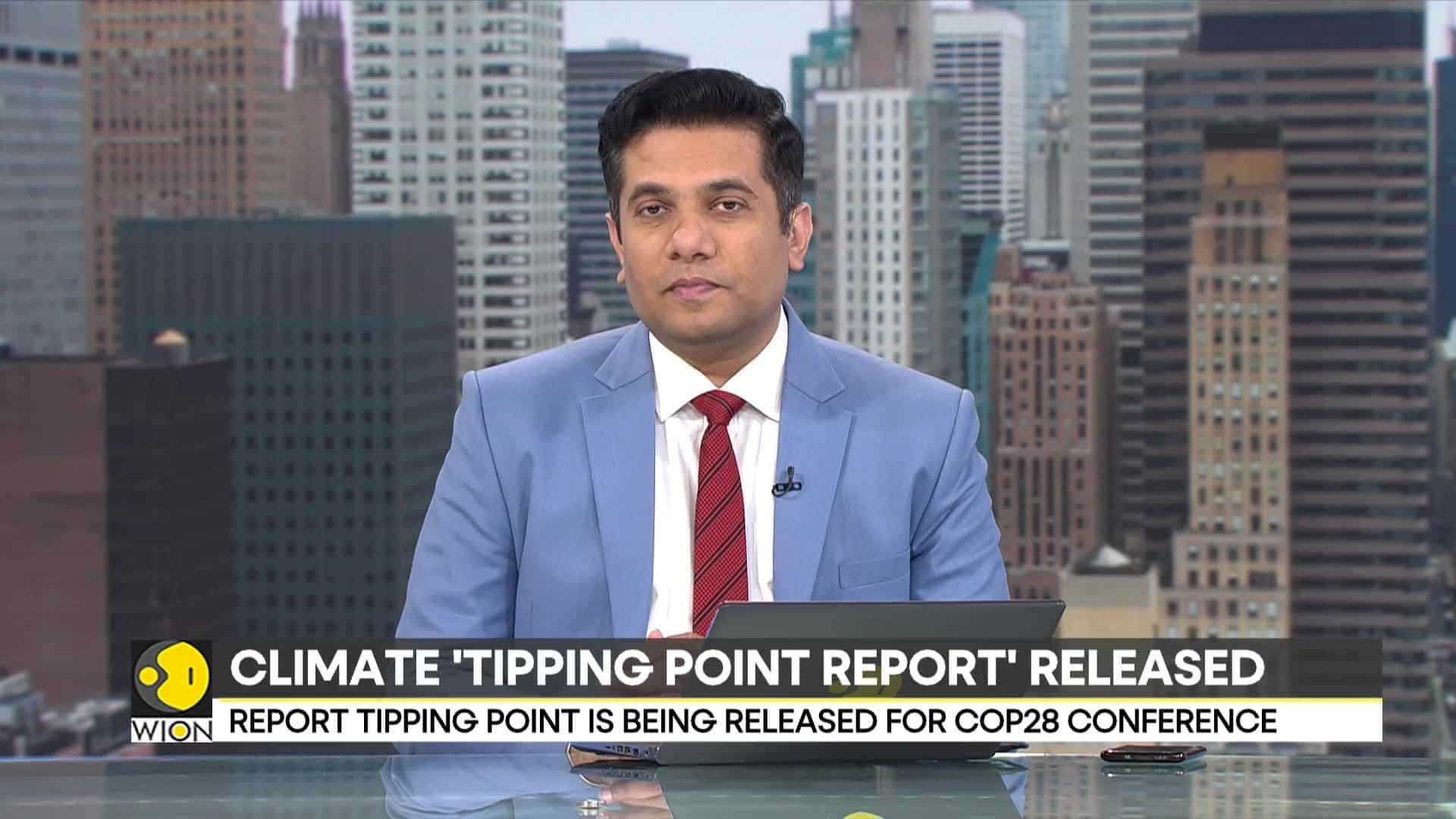
Climate 'Tipping Point': World is at a pivotal point, govt should act now to save planet
2:26
Germany's climate envoy, Jennifer Morgan, suggested any call for blocking a deal would be felt most by small countries vulnerable of sea level rise caused by global warming.
“Right now, countries here are fighting for their lives. The small islands, and most countries here, are engaging very actively on this discussion in a real way,” she said in an interview. “And I think it is obviously not responsible to have a position that could mean — would mean — the life and death of many million people.”
But not all developing countries felt the same way.
“The development of our countries depends, in fact, on the use of fossil fuels," said Niger's Issifi Boureima, who's executive secretary of the Sahel Region Climate Commission. “It’s not easy for countries like ours to accept a text that agrees to end fossils fuels today. It’s not easy, because what do we do after that?”
"I think that in the dynamic of multilateral diplomacy, we need to avoid egoism, egoism of the north towards the south.”
COP28 Director General Majid al-Suwaidi downplayed the OPEC letter, saying the UAE team running the climate conference has been meeting with negotiators to get an ambitious deal. The oil cartel has no formal link to the climate negotiations.
“I feel confident that we’re going to get a good result you’re going to be surprised about,” Suwaidi told The Associated Press.
OPEC didn’t immediately respond to messages seeking comment. Protestors Saturday in a flash mob briefly blocked the OPEC exhibit at climate talks, calling for an immediate phase-out of fossil fuels.
As discussions were happening about the letter and how to transition from fossil fuels, the world inched closer to deciding where next year’s climate conference will be held, a third state petrostate. Azerbaijan announced it would host COP29 in Baku, where one of history’s first oil fields sprung up. But U.N. officials said it wasn’t quite a done deal because the proper paperwork hasn’t been submitted.
The conference presidency has been crowing about deal after deal, many of them involving hundreds of millions or even billions of dollars of pledges, but they’ve more nibbled the edges of the key issue of cutting emissions. When it comes to reducing the gases that cause climate change, a key group of scientists who analyze pledges, actions and potential temperature increases said in a report on Saturday that all the action hadn't amounted to much.
“The COP28 Presidency has made a very big deal about a whole lot of voluntary initiatives, while adopting an ambiguous and weak position on the central issue of a fossil fuel phaseout,” Climate Analytics CEO Bill Hare, co-author of the report, said.
Saturday's firestorm of controversy came as protests at the conference center in Dubai ramped up, with a “Global Day of Action” urging nations to move decisively to stop climate change and officials from various countries talked increasingly urgently at the official meetings. The OPEC letter has added fuel to their fury.
“With current policies, the planet is on track to a 2.9 (degree Celsius, 5.2 degree Fahrenheit above pre-industrial temperature) future. We cannot adapt to temperature rise that high; the loss and damage will be incalculable. It will be our death sentence,” Marshall Islands natural resources minister John Silk said.
“We will not go silently to our graves,” he said.
___
Associated Press journalist Olivia Zhang contributed.
Brazil's Lula takes heat on oil plans at UN climate talks, a turnaround after hero status last year
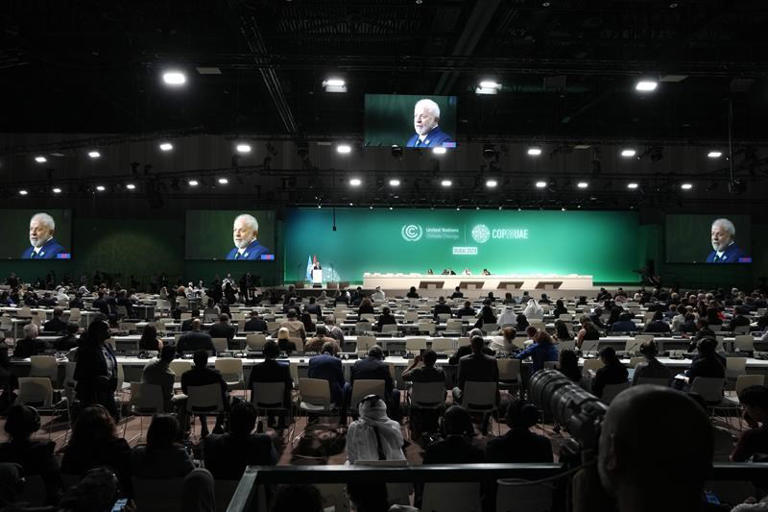
DUBAI, United Arab Emirates (AP) — Fresh off election victory, a year ago Brazilian President-elect Inacio Lula da Silva was the star of the annual U.N. climate talks.
Lula promised to crack down on deforestation and turn Brazil into an environmental leader, a complete turnaround after President Jair Bolsonaro rolled back regulations and encouraged land-grabbing in the Amazon.
“Lula! Lula! Lula!” many onlookers screamed during Lula’s many events at COP27 in Egypt.
What a difference a year makes.
Just as Lula addressed world leaders at COP28 in Dubai, it was announced that Brazil would join OPEC+, a group of big oil-exporting countries, including Russia. At one event during the conference, Lula tried to explain the decision by saying that, once on the inside, the South American nation would push other oil-producing countries to transition to green energy—a curious explanation given that state-run oil company Petrobras is focused on further oil exploration. Lula later clarified that Brazil would be an OPEC observer, not a full member.
In his speech to world leaders, Lula implored delegates to go beyond “eloquent but empty words.” In a subsequent session with Environment Minister Marina Silva, Lula teared up when he talked about the need to protect forests.
Instead of chants of adulation, Brazil received a Fossil of the Day award from Climate Action Network International, a non-award given to countries whose actions support fossil fuels, the main cause of climate change.
Natalie Unterstell, president of Talanoa, a Brazilian think tank focused on climate, said Lula's approach to the environment was focused on curbing deforestation, Brazil's largest source of carbon emissions, which his administration has managed to slow by half since taking office in January. That approach served him well during his first terms, between 2003 and 2010, but that is no longer enough, she said.
“Lula can’t be a climate leader without a real energy transition policy,” she said. “It's time for him to update his programming software.”
Lula has had a long and complicated relationship with oil. When huge reserves were discovered off Brazilian shores in 2006, Lula said: “This discovery ... proves that God is Brazilian.” Indeed, as the Brazil became a major oil-producer over the next decade, the money helped Lula, and then successor President Dilma Rousseff, fund major social programs that lifted tens of millions of people from poverty.
Today, Brazil is the world's ninth largest producer, with 3% of global output, according to the U.S. Energy Information Administration. Oil has become so important that it's now Brazil's second export product after soy, producing 3.67 million barrels a day. By far, China is the country's largest buyer.
At a climate conference focused on reducing planet-warming greenhouse gas emissions, which oil and gas products let off when burned, environmentalists have been quick to note the contradiction.
Meanwhile, Petrobras is doubling down on oil. On Dec. 13, a day after the climate conference is scheduled to end, the country is going to allow companies to bid on 33 areas with blocks for oil exploration, according to Brazil's National Agency of Oil, Natural Gas and Biofuels, including some in the Amazon rainforest. It's part of a push to offer more than 900 blocks in December.
In a written response to the AP, the National Agency of Oil, Natural Gas and Biofuels declined to comment on demands for energy transition, arguing that, as a regulatory agency, it “does not create public policies but rather implements the policies formulated by the government."
The increased exploration, which eventually leads to more production, threatens to cancel out or even surpass gains from Brazil's efforts to stop net deforestation by 2030, according to the Greenhouse Gas Emission Estimation System, an initiative by the Climate Observatory, a network of environmental nonprofit groups.
“The damage (of the exploration) goes against any positioning of Brazil as a climate leader," said David Tsai, projects coordinator at the Institute for Energy and the Environment, which is part of Climate Observatory.
While Lula fumbled during the few days he spent at COP28, his Colombian counterpart, leftist Gustavo Petro, seemed to be taking the mantle of environmental leadership in Latin America. In contrast to Brazil’s alignment with OPEC, Petro joined an alliance of nations supporting a fossil fuel non-proliferation treaty. “This is not economic suicide,” he said in Dubai. “It’s about preventing humanity’s self-destruction.”
The leaders' differing visions were on display in August during the Amazonian summit in Belem. Lula and other leaders vetoed Petro’s proposal to ban oil production in the world’s largest rainforest. Similar to the ongoing climate talks, oil was the most contentious topic during the meeting held in Belem. At the time, Lula faced protests by Indigenous groups and environmentalists against Petrobras’ plans to explore for oil near the mouth of the Amazon River.
Petrobras did not respond to AP's written request for comment on its plans for the mouth of Amazon and on energy transition. Lula's office also did not respond to a request for comment.
Environmentalists say they hope Lula can be convinced to change policies by 2025, when Brazil is expected to host COP30 in Belem. Whatever the next years bring, at the moment the administration is marching ahead.
“We will not be ashamed of Petrobras,” Brazil’s minister of mines and energy, Alexandre Silveira told daily newspaper O Estado de S. Paulo in an interview this week. “We will not be ashamed of also having the potential of fossil fuels in Brazil. They need to be explored because Brazil is a country in which social injustices and prevalent.”
_
No comments:
Post a Comment